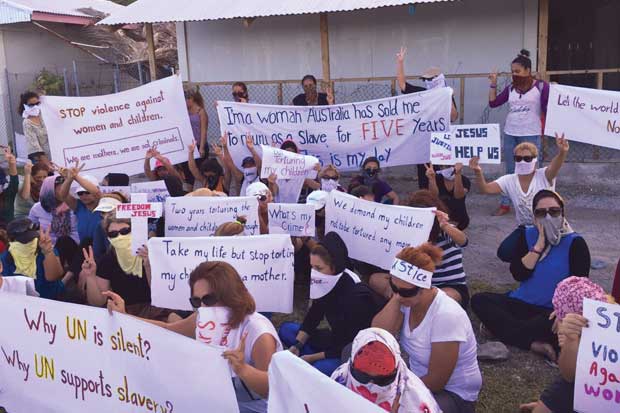New Matilda has gained access to an email sent by the Department of Immigration and Border Protection (DIBP), stripping asylum seekers of basic rights: the right to Freedom of Information (FOI) requests.
Previously, everyone in Australia had the right to request from the government documents relating to them. When making claims for asylum, asylum seekers who came by boat would send in FOI requests, seeking information about things like entry interviews they did with the government from when they first arrived.
For this article, I conducted an email interview with my former supervisor Katie Wrigley, the Principal Solicitor at Australia’s premier provider of legal advice to asylum seekers, the Refugee Advice and Casework Service (RACS). I know Katie from the six months I spent doing my Practical Legal Training at RACS.
She explains that the record of the entry interview is “really useful for any lawyer helping that person in completing an application for asylum in the future: person’s name, date of birth, family structure – the names and dates of birth of all family members, travel history, citizenship, ethnicity, religion, work history, education history. It tells you whether they have rights to enter and reside in any third country.”
These records contain “a brief indication of their claims, but what’s more valuable is the data that will help you assess what’s likely to be relevant for that person to now address to flesh that out in the future with a lawyer to properly address their claims more fully. Ask a person to remember every place they’ve ever lived, worked and the months and years that they started and finished each of those including the months and years they started primary school, high school and any tertiary education is very difficult. Having the document that sets out what they said last time is invaluable.”
In the past, these documents were provided by the Department to a person’s migration representative, when legal assistance was available, without requiring any request under FOI.
Now, not only is legal assistance not available, but the government has announced a new policy, whereby asylum seekers who are not currently allowed to make protection visa claims will not have their FOI requests processed and will have those requests returned to them.
In the email sent to stakeholders, the FOI Section of DIBP observes that not all asylum seekers are currently eligible to validly apply for protection visas. The Gillard government implemented a “no advantage policy”, whereby asylum seekers who arrived after August 12, 2012 would not have their claims for asylum processed.
This built up a backlog of perhaps 30,000 asylum seekers who had claims for asylum which were unprocessed.
When the Coalition was elected into power, without lifting this bar, it passed a raft of legislation, slanting the process against asylum seekers, and introducing a “fast-track” process.
This process is “fast” because it has dispensed with the kind of processes, delays and reviews that a fairer process would inevitably include.

With the new legislative framework in place, the government has started inviting asylum seekers who were previously barred – those who arrived by boat on or after August 13, 2012 – to apply for asylum.
On the DIBP website, it says: “Applicants who think they need personal information that we hold should wait until it is close to their turn to be processed to seek that information.”
At this point in time, there is no indication if, or when, asylum seekers will be informed that it is “close to their turn” to have their claims for asylum processed.
What this means is that there are perhaps tens of thousands of asylum seekers who overnight have lost a very basic right: the right to seek documents held by the government about them.
These documents are often of fundamental importance in making a claim for asylum, and in understanding fully what elements need to be proven.
Once people have these documents, they can begin the process of chasing the various bits and pieces of evidence that may mean the difference between being allowed to stay in Australia as a refugee, and being deported back to danger as a supposedly illegal immigrant without valid claims of persecution.
Denying asylum seekers FOI rights adds to the many assaults the Coalition government has made in making the process of seeking asylum more unfair on asylum seekers.
The Coalition has slashed funding to legal representation to asylum seekers, and even slashed funding to interpreting services for asylum seekers.
Te Refugee Advice and Casework Service (RACS) anticipated the huge rush of claims of asylum seekers that it would have to work through once the bar on applications was lifted. As an organisation with a small staff and an impending massive workload, it started doing the preliminary work of dealing with these claims.
It lodged their FOI claims, read through the documents when they arrived, and took statements in preparation for when the bar was lifted and these asylum seekers were able to make their claims.
The effect of the new policy will be to sharply limit the window of when work on a claim by an asylum seeker can be done.
Once the FOI requests are lodged, and then received, lawyers can then translate them and put them to asylum seekers, take their statements, and help them draft a claim for protection.
Once the bar is lifted on an asylum seeker, they have 28 days to lodge their claim for a protection visa. This is already a very short process, for people who usually don’t speak English and who will need translators.
Many will have special vulnerabilities – they may be children, they may have mental health issues, they may be deeply traumatised – which may make it difficult to get a calm, factually precise and convincing statement of why they need asylum.
This is yet another hurdle the government has placed in the way of asylum seekers getting a process which will give them a fair and reasonable chance to plead their case.
Wrigley explained that asylum seekers denied this right “are now to be treated much less favourably than any other person wanting to make an application under FOI to the Department in terms of an unprecedented change to longstanding principles of freedom of access to personal information.”
Everyone else has “a right to seek access to personal information held by the DIBP at any time under freedom of information laws”.
Wrigley observes that DIBP “doesn’t provide any information about when it is close to a person’s turn to apply, so it is impossible for a person to know that in order to make an FOI application with reference to when permission will be granted.”
This means that the 28-day period in which asylum seekers will be expected to make asylum claims will now include the process of making an FOI request and then reviewing the documents.
Wrigley explains that “FOI requests must be processed within 30 days”. This means that asylum seekers might not be able to get their FOI documents back before their protection visa claims are due.
According to Wrigley, “Before FOI documents arrive – a person can write down their own statement draft,” but generally lawyers and migration agents, who help asylum seekers in making claims, would not “want to meet with a person to conduct an interview addressing their claims until they had access to their previous documents, as you would be working blind from their memory rather than having the benefits of what they have previously spent time providing to the Department in the past.”
The likely effect will be to create more work for underfunded legal services for asylum seekers, and to produce weaker applications, due to a lack of time, resources, and access to information held by the government.

None of this is a necessary part of the process – the Coalition government has intentionally chosen these policies, though their effect on asylum seekers are readily apparent.
Even if DIBP did give notice to asylum seekers that they would soon be able to apply for asylum, this would probably be of little help. Wrigley notes that “Given that legal services have been cut, it’s unlikely that many asylum seekers will understand what happens if their form is returned to them or what any accompanying letter means. With no service funded to provide them with advice in their own language, returning the forms is likely to cause more chaos.”
It should be noted that if asylum seekers could lodge FOI requests before their bars are lifted, they would be able to be better prepared for the process. Wrigley notes that this is “in the Department’s interests because it will create less delay once they are allowed to apply and the information they provide in their applications will be more complete and accurate.”
Wrigley characterises these changes as “outrageous and unprecedented”. She explained that, “Yet again the rights of boat arrivals are being flat out denied. It’s another hurdle for these people to overcome.
“First we made them wait in detention for months, then we didn’t give them work rights. Now something as simple as being given access to their own documents is being restricted.
“When we’re denying people access to lawyers, access and early access to information is critical to a person being able to prepare for when they need to make out their claims and fill out the forms.”
This story may lack the sensationalism of reports of people smugglers being paid by Labor and Coalition governments to send boats back to Indonesia.
Yet the grim truth is that dry and technical changes to law and policy affecting asylum seekers – the kind that is hard to explain – is the kind that will ruin thousands of lives.
Quietly making the process of seeking asylum harder and more unfair might have disastrous effects on possibly tens of thousands of lives.
Refugees who have fled utter horrors from countries like Syria and Afghanistan might be sent back to their persecutors, simply because we instituted a process that didn’t give them a fair chance to be heard.
These measures may seem minor and technical, yet that is precisely when we should be the most vigilant, because that may just be the most effective way to whittle away at fundamental human rights and freedoms.
Donate To New Matilda
New Matilda is a small, independent media outlet. We survive through reader contributions, and never losing a lawsuit. If you got something from this article, giving something back helps us to continue speaking truth to power. Every little bit counts.



